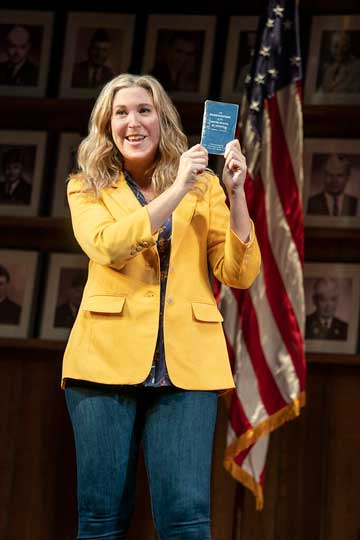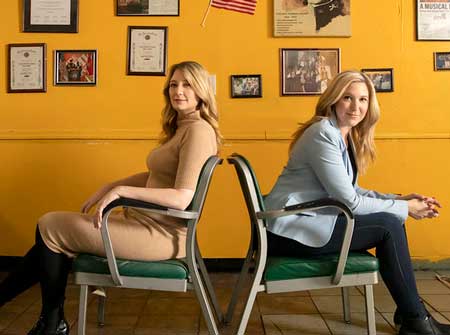Play (2017)
by Heidi Schreck
Directed by Oliver Butler
With Cassie Beck, Gabriel Marin, Emilyn Toffler (on alternate nights), Jocelyn Shek (on alternate nights)
Huntington Theatre Company
Emerson Cutler Majestic Theater
Theater District, Boston
February 22 – March 20, 2022

“What the Constitution Means To Me”
Photo: Joan Marcus
Courtesy of Huntington Theatre Company
Heidi Schreck made a significant impact on Broadway theater in 2019 when her play and largely solo tour de force performance landed there. I knew it was inspired by Schreck’s experience as a teenager taking part in an oratorical competition about the Constitution, but I did not really know the extent of it. This production at the Huntington Theater, now with the engaging Jessie Beck in the lead role, is indeed a powerful, dynamic, disturbing and equally entertaining piece of theater packed into under two hours that begins with a simulation of the young person’s oratorical competition and rapidly goes way beyond it.
The middle-aged character of Heidi Schreck (Cassie Beck) soon takes over and offers extensive commentary on the Constitution, offering detailed analyses of clauses in several amendments to the Constitution, including the purposefully ambiguous Ninth Amendment, written by James Madison, which guarantees a set of intentionally non-enumerated rights, and the Fourteenth Amendment, written after the Civil War, guaranteeing citizenship to slaves. As Beck’s Schreck points out vividly and entertainingly, the Ninth Amendment, though well-intentioned to be forward-looking and flexible, left many openings and loopholes, serving to lay the groundwork for the passage of Roe v. Wade in 1973, but also laying the groundwork for its contentious status later on. The Fourteenth Amendment, as Beck’s Schreck further elaborates, made slaves citizens, but did not address Native Americans, and did not give full citizenship rights to women, who did not get the right to vote until 1920. The elaboration on the Constitutional complexities is nonstop, and the amount of material and analysis is more than one can absorb in a single listening, but it is transfixing, overwhelmingly informative and surprisingly entertaining.
A tape of an actual discussion between Supreme Court Justices Scalia and Breyer about the meaning of the word shall in one of the Constitutional clauses (does it in fact mean should?) adds to the complexities. The context is heartbreaking: the case of Jessica Linehan, a Colorado mother who sought protection from an estranged ex-husband who ultimately killed their three daughters; the nature of Breyer’s and Scalia’s interchange, though tied to Constitutional interpretation, vividly reflects the extremity and oddness of intellectual judicial distance from the tragic circumstances of the case.
On a more appealingly immediate level is a tape of Ruth Bader Ginsburg speaking energetically and supportively about the role of women on the Supreme Court.
As well, there are humorous kinetic moments replaying some of the family memories that Schreck calls to mind, including her mother’s employment as a log-runner in the state of Washington, where Schreck grew up. Beck’s Schreck dances back and forth across the stage to simulate what that log-running is like and it gives a few moments of welcome movement amid the largely verbal goings on.
Less kinetic and more painful are Schreck’s account of the horrors her sisters underwent with a transgressive stepfather and the legal ends which they pursued in order to call him to account.
In addition to particular analyses of clauses in the Constitution, some jarring and little-known facts are presented – for example, that the number of murders of women in America through domestic violence has exceeded the number of American deaths through wars, a horrifying realization dropped in the midst of this informative, gripping and entertaining production.
The narrative, since taking on Beck as a new actor in this production, is very similar to the original show, but has been modified later on in the performance when the fourth wall is dropped to identify Beck as the actor who portrays Schreck, but which, apart from that and the corresponding alterations implied, takes things in a similar direction to the original.
This production is indeed vivid and fresh, but if one compares it with the original (available to stream on Amazon Prime) it is striking how similar the two versions are. Schreck, of course, in the original, carries the weight of her own story with power and conviction. Remarkably, Beck as Schreck, in this new version of the original, manages to do that equally well.

Cassie Beck, who plays Schreck and herself
in “What The Constitution Means To Me”
Photo: Joan Marcus
Courtesy of Huntington Theatre Company
Near the end, in her own role, Beck welcomes (on the night I saw it) Emilyn Toffler, a trans young man of seventeen who serves as an interlocutor and debate partner in a final faceoff about whether the US Constitution should be preserved or disposed of. Toffler is endlessly charming, articulate and brilliant and provides an adept and compelling foil for Beck. The final debate is gripping and well executed and give a wonderful capstone to what precedes it. (Jocelyn Shek plays this role on alternate nights. It is very much worth watching the filmed version to catch Rosdely Ciprian, a young black woman, play the same role. She is equally transfixing. Writing for the role in the original and current productions is the same, but these kids are spontaneous and powerful, a testament to their acting, and to the direction of the original production by Marielle Heller and of the current production by Oliver Butler.)
Also in support is Gabriel Marin, who plays the American Legion timekeeper with appropriate self-containment at the outset and with charmingly unexpected revelations later on. (Mike Iveson plays the role in the filmed original, and is also worth catching.)
There is a two part coda to emphasize audience involvement that I could well do without. The first part is a voicing by an audience member to represent the audience’s sentiment about whether to preserve or to shelve the Constitution. After that, there is a feeding of random questions to the two debaters about nothing particularly relevant to the subject of the Constitution or to the debate; presumably they were collected from the previous night’s audience.
Though well-intentioned, these seem superfluous and not an enhancement of the otherwise powerful narrative.
– BADMan (aka Charles Munitz)
Leave a Reply